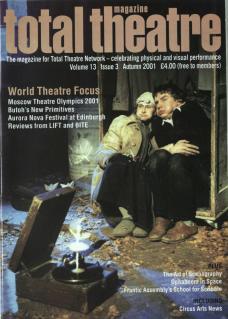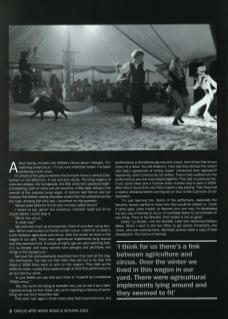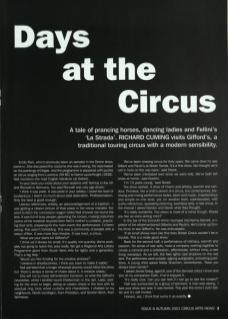About twenty minutes into the Giffords Circus show I thought, ‘I'm watching a real circus.' I'm not sure what that meant. I've been pondering it ever since. I'd arrived at the ground behind the Exmouth Arms in central Cheltenham in mid-afternoon. It was dull and cloudy. The living wagons of crew and artistes, the swingboats, the little white tent appeared slightly forbidding, both on show and yet secretive. A little later, sitting in the warmth of the restored living wagon of director Nell Stroud and her husband Toti Gifford, eating chocolate eclairs from the patisserie across the road, drinking Earl Grey tea, I launched my big question:
‘Where does Giffords fit into this monster called Circus?’
I meant to say 'genre' but somehow 'monster' leapt out of my mouth before I could stop it.
‘We're new circus.’
In what way?
‘We work very much as an ensemble. None of us is from circus families. We're rural cousins to trendy London circus. I think for us there's a link between agriculture and circus. Over the winter we lived in this wagon in our yard. There were agricultural implements lying around and they seemed to fit. A couple of nights ago we were watching Fellini's La Strada and many scenes have ploughs and pitchforks and things in the background.’
Nell and Toti enthusiastically described how they built all the wagons themselves. Toti told me that when they set out to do their first stand in 2000 there were no tyres on the wagons. They held up the traffic for miles. Luckily they made enough at their first performance to go out and buy some.
'In your leaflet you say that your show is "inspired by a traditional 1930s circus".’
‘Yes, but we're not trying to recreate one, just to use it as a starting point and go on from there. Like we're inventing a memory of something not real but it becomes real.’
That word 'real' again. I think I knew what Nell meant this time. Any performance is simultaneously real and unreal, even those that let you know it's a show. You still believe it. How had they devised the show? Had Nell's experience of writing Josser influenced their approach? Apparently, she'd consciously not written. They'd held auditions for the performers to see how they played together. They had no particular formula: some ideas and a musical clown number they'd used in 2000. After they'd found their cast they'd spent a day playing. Then they had a week's rehearsal before coming out on tour. It was a process of collaboration.
‘I'm just learning this. Some of the performers, especially the dancers, simply wanted to know how they would be slotted in. I think it takes ages, years maybe, to discover your own way. I'm developing my own way of looking at circus. It's probably better to concentrate on one thing. Think of the Brontës. Their poetry is not so good.’
Earlier La Strada, now the Brontës. Later she mentioned William Blake. When I went to the box office to get tickets Christophe, the clown, who was working there, discreetly pushed aside a copy of Noel Streatfield's The Circus is Coming.
Emily Park, who'd previously been an aerialist in the Dome show, came in. She discussed the costume she was making, the style based on the paintings of Degas. And the programme is peppered with quotes on circus ranging from Lucretius (50 BC) to Dame Laura Knight (1936). Nell mentions she read English literature (at Oxford).
'In your book you wrote about your seasons with Santus in the UK and Roncalli in Germany. You said Roncalli was very ego driven.'
'I think it was pride. It was pride in your artistry. I loved the level of exuberance. I learnt so much about total dedication. Professionalism. Only the best is good enough.’
Literary references, artistry, an acknowledgement of a tradition – I was getting a clearer picture of their place in the circus monster. Toti went to fetch the concession wagon whilst Nell showed me round the tent. It was full of busy people; grooming the horses, making costumes (some of the material recycled from Nell's mother's curtains), practicing their acts, preparing for the main event: the performance. I'd been wrong. This wasn't forbidding. This was a community of people with a raison d'être. It was more than theatre. It was lived, a circus.
‘What are your plans for Giffords?’
‘I think we'll always be small. It's quality not quantity. We're probably not going to leave this area really. We got a Regional Arts Lottery Programme grant from South West Arts for lights and a generator. That's a big help.’
‘Would you like funding for the creative process?’
'I believe in showbusiness. I think you have to make it viable.’
Nell admitted that a longer rehearsal process would refine the show but there's always a sense of chaos about it. A creative chaos.
She left me to meet administrator Cameron, to write the Giffords newsletter, whilst I strolled round Cheltenham in the rain. Later, waiting for the show to begin, sitting on plastic chairs in the tent with its sawdust ring, blue velvet curtains and chandeliers, I chatted to my neighbours, Derek Londngen, from Prestatyn, and Gordon Birch, from Wilmslow.
‘We've been chasing circus for forty years. We came down to see Gilbert and Paulo's at Brean Sands. It's a fine show. We thought we'd call in here on the way back,' said Derek.
'We've been interested ever since we were kids. We've both left wives at home,’ said Gordon.
'I'm 73 years young,’ said Derek.
The show started. A show of charm and artistry, warmth and candour. Timeless, like a child's dream of a circus, but contemporary, borrowing and mixing performance styles, idioms and music. Unpretentious and simple on one level, yet, on another level, sophisticated, with quirky references, appealing clowning, seamless acts. A real circus. In the interval I asked Gordon and Derek what they thought.
‘It's really wonderful. The clown is more of a mime though. Would you like an extra-strong mint?’
In the bar of the Exmouth Arms I bumped into Kenny Damell, proprietor of the aforementioned Gilberto and Paulo's. He'd come up from his show to see Giffords. He was enthusiastic.
‘If all small shows were like this then British Circus wouldn't be in trouble. This is a really good show.’
Back for the second half, a performance of intimacy, warmth and passion. No sense of star acts, more a company working together to create a carnival and a celebration, affectionate, without irony, a rare thing nowadays. As we left, the fairy lights cast shadows on the wet tent. The performers were outside, signing autographs, answering questions. A young child asked Nikita Shannon, contortionist, 'Have you always been bendy?’
I asked James Greig, aged 8, one of the sternest critics I know and son of my companion Cath, if he'd enjoyed it.
'It's really cool. Can you ask Nell I can go to see the horses?’
Nell was surrounded by a group of admirers. A man was saying, ‘I saw your show last year. It was honest. This year the show's even better and it's still honest.'
Honest, yes, I think that sums it up exactly.


